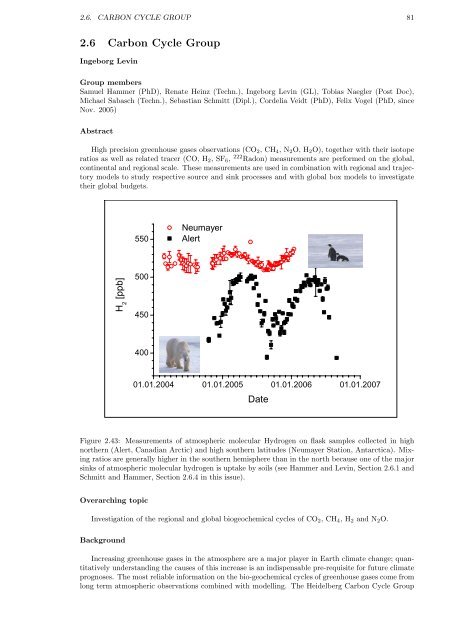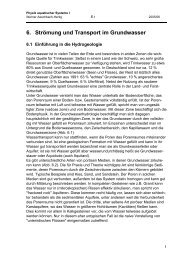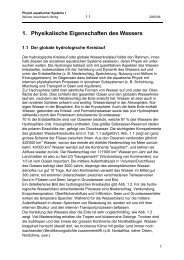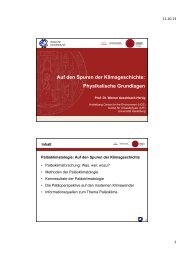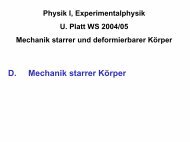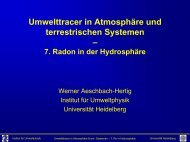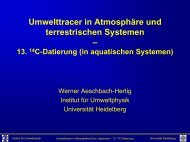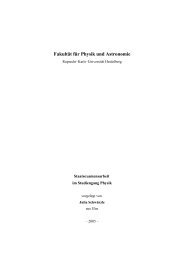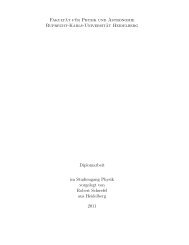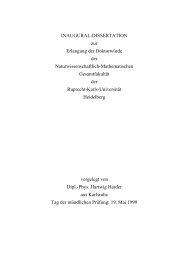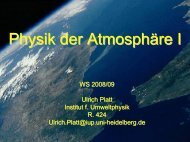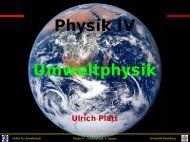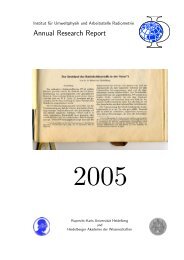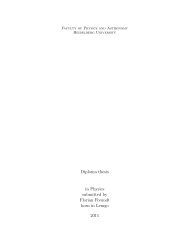80 CHAPTER 2. ATMOSPHERE AND REMOTE SENSING References Aiuppa, A., Franco, A., von Glasow, R., Allen, A. G., D’Alessandro, W., Mather, T. A., Pyle, D. M., & Valenza, M. 2006. The tropospheric processing of acidic gases and hydrogen sulphide in volcanic gas plumes as inferred from field and model investigations. Atmos. Chem. Phys. Discuss., 6, 11653 – 11680. Bobrowski, N., von Glasow, R., Aiuppa, A., Inguaggiato, S., Louban, I., Ibrahim, O. W., & Platt, U. 2006. Halogen Chemistry in Volcanic Plumes. J. Geophys. Res., in press. Keene, W. C., Stutz, J., Pszenny, A. A. P., Maben, J. R., Fisher, E., Smith, A. M., von Glasow, R., Pechtl, S., Sive, B. C., & Varner, R. K. 2006. Inorganic chlorine and bromine in coastal New England air during summer. J. Geophys. Res., accepted. Meyer, R., Büll, R., Leiter, C., Mannstein, H., Pechtl, S., Oki, T., & Wendling, P. 2006. Contrail observations over Southern and Eastern Asia in NOAA/AVHRR data and intercomparison to contrail simulations in a GCM. Int. J. Remote Sensing, in press, Also available as Report No. 176, <strong>Institut</strong> <strong>für</strong> Physik der Atmosphäre, DLR Oberpfaffenhofen. Pechtl, S., Schmitz, G., & von Glasow, R. 2006a. Modeling iodide iodate speciation in atmospheric aerosol. Atmos. Chem. Phys. Discuss., 6, 10959 – 10989. Pechtl, S., Lovejoy, E. R., Burkholder, J. B., & von Glasow, R. 2006b. Modeling the possible role of iodine oxides in atmospheric new particle formation. Atmos. Chem. Phys., 6, 503 – 523. Ponater, M., Pechtl, S., Sausen, R., Schumann, U., & Hüttig, G. 2006. A state-of-the-art assessment of the potential of the cryoplane technology to reduce aircraft climate impact. Atmos. Environment, 40, 6928 – 6944. Schofield, R., Johnston, P. V., Thomas, A., Kreher, K., Connor, B. J., Wood, S., Shooter, D., Chipperfield, M. P., Richter, A., von Glasow, R., & Rodgers, C. D. 2006. Tropospheric and stratospheric BrO columns over Arrival Heights, Antarctica during the spring polar vortex split, 2002. J. Geophys. Res., 111, D22310, doi:10.1029/2005JD007022. Smoydzin, L., & von Glasow, R. 2006. Do organic surface films on sea salt aerosols influence atmospheric chemistry? A model study. Atmos. Chem. Phys. Discuss., 6, 10373 – 10402. von Glasow, R. 2006a. Halogens in the marine boundary layer. Invited talk, UK SOLAS meeting, Manchester, 17. - 18. July 2006. von Glasow, R. 2006b. Importance of the surface reaction OH + Cl − on sea salt aerosol for the chemistry of the marine boundary layer - a model study. Atmos. Chem. Phys., 6, 3571 – 3581. von Glasow, R., & Crutzen, P. J. 2004. Model study of multiphase DMS oxidation with a focus on halogens. Atmos. Chem. Phys., 4, 589 – 608. von Glasow, R., & Crutzen, P. J. 2006. Tropospheric halogen chemistry. In: The Atmosphere (ed. R. F. Keeling), Vol. 4 Treatise on Geochemistry (eds. H. D. Holland and K. K. Turekian), in press. Elsevier-Pergamon, Oxford. von Glasow, R., Sander, R., Bott, A., & Crutzen, P. J. 2002a. Modeling halogen chemistry in the marine boundary layer. 1. Cloud-free MBL. J. Geophys. Res., 107, 4341, doi: 10.1029/2001JD000942. von Glasow, R., Sander, R., Bott, A., & Crutzen, P. J. 2002b. Modeling halogen chemistry in the marine boundary layer. 2. Interactions with sulfur and cloud-covered MBL. J. Geophys. Res., 107, 4323, doi: 10.1029/2001JD000943. von Glasow, R., von Kuhlmann, R., Lawrence, M. G., Platt, U., & Crutzen, P. J. 2004. Impact of reactive bromine chemistry in the troposphere. Atmos. Chem. Phys., 4, 2481 – 2497. WMO (ed). 2006. Scientific Assessment of Ozone Depletion: 2006. World Meteorological Organization Global Ozone Research and Monitoring Project: Geneva.
2.6. CARBON CYCLE GROUP 81 2.6 Carbon Cycle Group Ingeborg Levin Group members Samuel Hammer (PhD), Renate Heinz (Techn.), Ingeborg Levin (GL), Tobias Naegler (Post Doc), Michael Sabasch (Techn.), Sebastian Schmitt (Dipl.), Cordelia Veidt (PhD), Felix Vogel (PhD, since Nov. 2005) Abstract High precision greenhouse gases observations (CO2, CH4, N2O, H2O), together with their isotope ratios as well as related tracer (CO, H2, SF6, 222 Radon) measurements are performed on the global, continental and regional scale. These measurements are used in combination with regional and trajectory models to study respective source and sink processes and with global box models to investigate their global budgets. H 2 [ppb] 550 500 450 400 Neumayer Alert 01.01.2004 01.01.2005 01.01.2006 01.01.2007 Date Figure 2.43: Measurements of atmospheric molecular Hydrogen on flask samples collected in high northern (Alert, Canadian Arctic) and high southern latitudes (Neumayer Station, Antarctica). Mixing ratios are generally higher in the southern hemisphere than in the north because one of the major sinks of atmospheric molecular hydrogen is uptake by soils (see Hammer and Levin, Section 2.6.1 and Schmitt and Hammer, Section 2.6.4 in this issue). Overarching topic Investigation of the regional and global biogeochemical cycles of CO2, CH4, H2 and N2O. Background Increasing greenhouse gases in the atmosphere are a major player in Earth climate change; quantitatively understanding the causes of this increase is an indispensable pre-requisite for future climate prognoses. The most reliable information on the bio-geochemical cycles of greenhouse gases come from long term atmospheric observations combined with modelling. The Heidelberg Carbon Cycle Group


